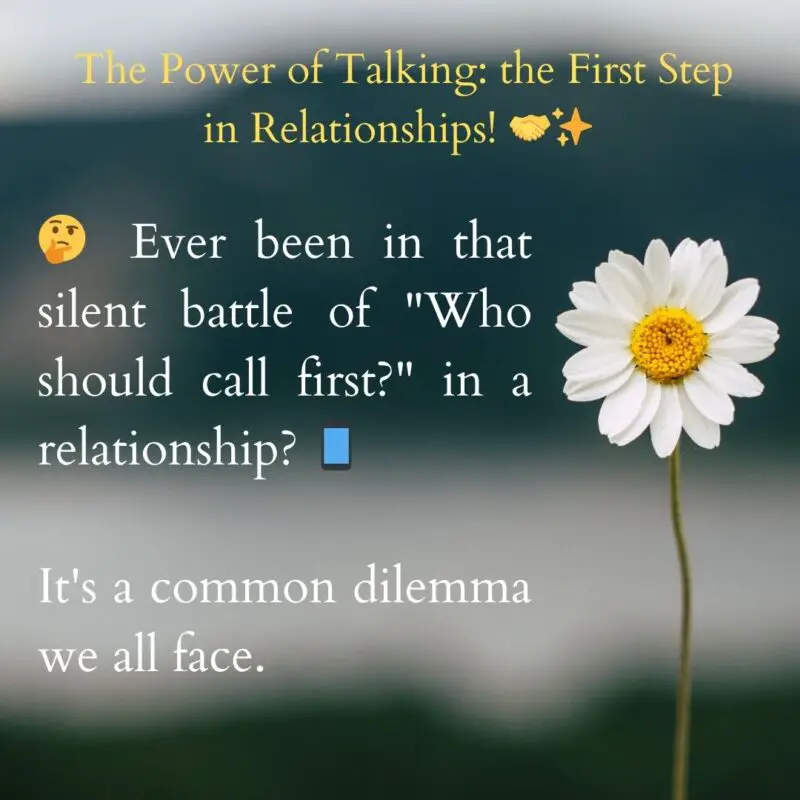In the intricate dance of relationships, moments of silence often become stumbling blocks. It’s not uncommon to find yourself wondering, “Why should I be the one to reach out?””Why do I always break the silence in relationships.” The unspoken expectation lingers, and a subtle standoff ensues. But what if breaking this cycle is the key to sustaining meaningful connections?

Silence in Relationships: The Untold Story of Connection
In the intricate web of human connections, silence often speaks volumes. It’s the unspoken tension, the lingering question of who should reach out first, that can either strain or strengthen relationships. Delve into the hidden dynamics of silence in relationships and discover how embracing vulnerability and breaking the silence can foster deeper connections and enrich the tapestry of your interactions.
Embracing Vulnerability:
In any relationship, be it with friends, family, or a significant other, a certain vulnerability underlies the need for connection. It’s easy to get caught up in the game of who should reach out first. Instead, consider embracing vulnerability and making the first move. It’s not about conceding but about expressing the importance of the relationship.
The Unseen Thread:
Have you ever felt the subtle tug of an unseen thread connecting you to someone? That thread is the delicate bond that ties hearts and transcends the need for regular communication. While it’s natural to desire reciprocity, sometimes taking the initiative can strengthen the thread and prevent it from fraying.
Breaking the Silence:
Silence can breed misunderstanding and distance. Breaking it requires courage and a willingness to prioritize connection over ego. If you find yourself pondering why the other person hasn’t called, consider that they might be navigating similar thoughts. A simple call or message can be the bridge to rekindling the warmth that silence threatens to extinguish.
The Power of Recognition:
Reaching out first isn’t a sign of weakness; it’s an acknowledgment of the value the relationship holds. When you make that call, you not only break the silence but also convey that the connection is essential to you. It’s a powerful act that can set the stage for open communication and understanding.
Navigating Expectations:
Rather than harboring expectations about who should make the first move, focus on the beauty of shared moments and experiences. Relationships thrive on shared laughter, support during challenges, and the joy of being present for one another. These are the pillars that withstand the tests of time and silence.
Breaking the Silence: Fostering Connection in Relationships
In the tapestry of relationships, breaking the silence becomes a pivotal stitch. It’s an active choice to nurture connections and celebrate the shared history that binds individuals. So, the next time you find yourself contemplating whether to call, remember that the beauty of connection often lies in the willingness to extend a hand first.
“In the symphony of relationships, the first note can be the sweetest melody.”
Do Follow for More Tips and Inspiration:
- Instagram: Follow us on Instagram
- Pinterest: Follow our Pinterest profile
For more insights into navigating the dynamics of silence in relationships, explore the article “The Crossroads: To Forgive or Not to Forgive“.
FAQs regarding “Silence in Relationships”
- Why does silence often create tension in relationships?
- How can embracing vulnerability help in breaking the silence in relationships?
- What are some common reasons why individuals hesitate to reach out first?
- Can silence in relationships be a sign of deeper issues?
- What are the benefits of breaking the silence and initiating communication?
- How can one navigate feelings of resentment or frustration when they feel they are always the one breaking the silence?
- Are there effective communication strategies to address the issue of silence in relationships?
- What role does reciprocity play in maintaining healthy communication patterns?
- How can couples create a balance between individual needs for space and the need for regular communication?
- Are there signs that indicate when silence in a relationship may be harmful or indicative of underlying problems?
